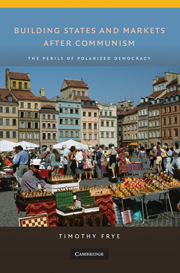Book contents
- Frontmatter
- Contents
- List of Tables and Figures
- Acknowledgments
- Introduction
- 1 The Political Logic of Economic and Institutional Reform
- 2 Political Polarization and Economic Inequality
- 3 The Pace and Consistency of Reform
- 4 Political Polarization and Economic Growth
- 5 Political Polarization and Policy Instability: The View from the Firm
- 6 Nationalism and Endogenous Polarization
- 7 Russia: Polarization, Autocracy, and Reform
- 8 Bulgaria: Polarization, Democracy, and Reform
- 9 Poland: Robust Democracy and Rapid Reform
- 10 Uzbekistan: Autocracy and Inconsistent Gradualism
- 11 Conclusion
- References
- Index
- Titles in the series
8 - Bulgaria: Polarization, Democracy, and Reform
Published online by Cambridge University Press: 05 June 2012
- Frontmatter
- Contents
- List of Tables and Figures
- Acknowledgments
- Introduction
- 1 The Political Logic of Economic and Institutional Reform
- 2 Political Polarization and Economic Inequality
- 3 The Pace and Consistency of Reform
- 4 Political Polarization and Economic Growth
- 5 Political Polarization and Policy Instability: The View from the Firm
- 6 Nationalism and Endogenous Polarization
- 7 Russia: Polarization, Autocracy, and Reform
- 8 Bulgaria: Polarization, Democracy, and Reform
- 9 Poland: Robust Democracy and Rapid Reform
- 10 Uzbekistan: Autocracy and Inconsistent Gradualism
- 11 Conclusion
- References
- Index
- Titles in the series
Summary
In 1994 Bulgaria's anti-communist government won a vociferous debate in parliament to detonate the mausoleum holding the remains of Georgi Dimitrov, the country's first communist leader. More than a ton of dynamite and several explosions, however, failed to bring down the hulking structure. One onlooker noted with sympathy for the old regime: “There is not enough ammunition to destroy our ideas.” The government quickly sent in bulldozers to tear down the statue.
International Herald Tribune, August 23, 1994Bulgaria offers a prime illustration of the impact of political polarization and democracy on economic reform. For the first seven years of the 1990s, a parade of old-left and right governments made policy in a polarized and relatively democratic environment, and progress in economic and institutional reform was dismal, even for the postcommunist world. Policy stability was low and successive governments engaged in inconsistent reforms that provided great benefits to their supporters at the expense of the public bourse, and social spending suffered. Not surprisingly, estimates suggest that the economy shrank by about one-third between 1990 and 1996 (EBRD 1997: 115).
In late 1996 the governing old-left Bulgarian Socialist Party collapsed and parliamentary elections brought a new majority led by the right-wing Union of Democratic Forces (UDF) to power. Under IMF scrutiny, the UDF government introduced a restrictive fiscal policy based on a currency board, revamped the tax system, instituted bankruptcy procedures, privatized the banking sector, and liberalized heating and energy prices.
- Type
- Chapter
- Information
- Building States and Markets after CommunismThe Perils of Polarized Democracy, pp. 192 - 212Publisher: Cambridge University PressPrint publication year: 2010



